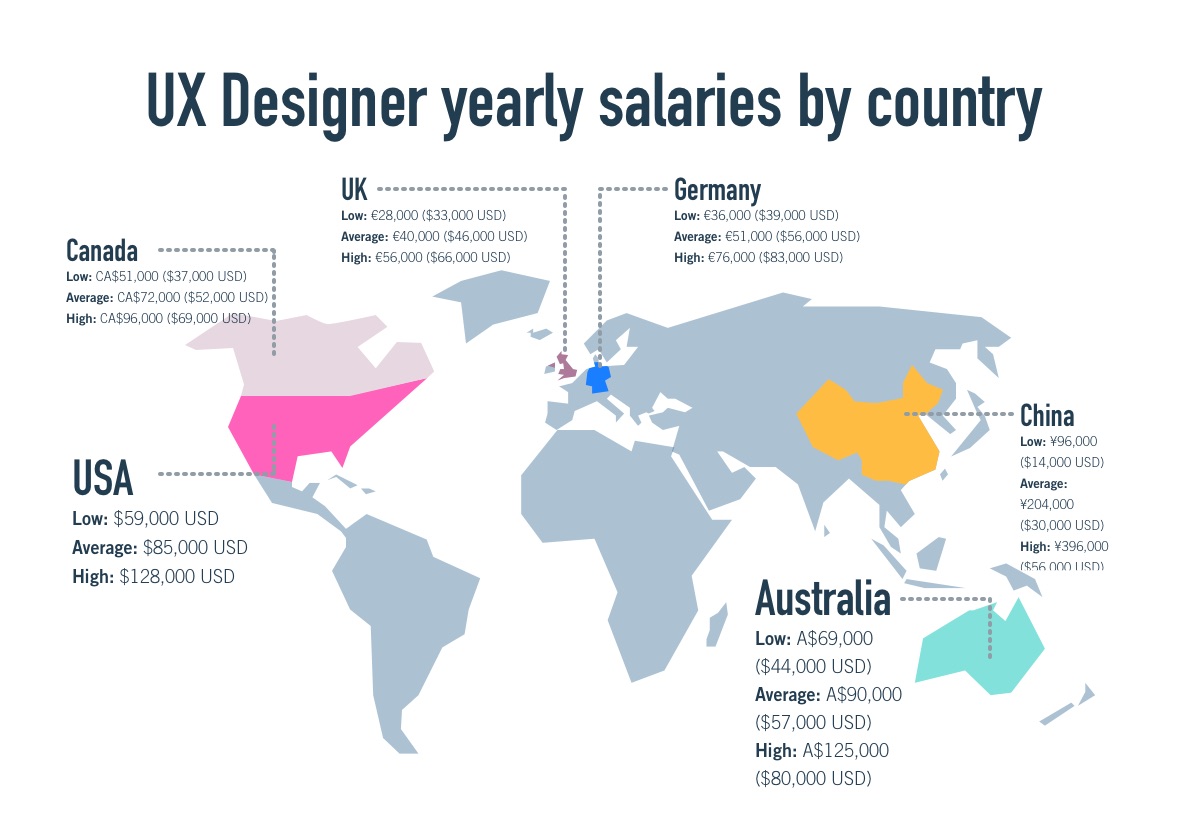So you’ve got the design job you wanted, and as much as you love the work—or at least like it enough that you want to stay on—you feel, for any number of reasons, that you deserve a higher salary. Here’s a guide to knowing if, when, and how you should ask for a raise.
Asking for a raise can be an uncomfortable task, but it’s a necessary conversation to have. A recent Glassdoor survey found that 45% of employees change jobs due to salary. If you’re happy in your job and aren’t ready to leave, it’s important that you’re able to negotiate your salary.
In this guide, we’ll look at why you should ask for a raise, when might be the best time to ask for a raise (or hold off just a bit longer), and give you some tips for how to have that conversation. We’ll start by addressing one fundamental insecurity that might be holding you back.
Here’s what we’ll cover:
- It’s normal to ask for a raise
- Why you should ask for a raise
- When you should ask for a raise
- How to ask for a raise
- Play for the long game
It’s normal to ask for a raise
What if my boss is shocked that I’d ask for more? What if they’re offended? What if I seem ungrateful? What if they say no?
These are common questions and fears to face at the prospect of asking your boss for a raise. So the first thing to understand is that asking for a raise is not a strange or unprofessional thing to do. It’s a normal thing to do.
Money can be a difficult thing to talk about (even taboo in some cultures and settings), so we may not often have the opportunity to learn from others’ mistakes or successes. But remember that these kinds of conversations:
- Happen all the time
- Should probably happen more often
- Could almost always be done better
Your job here is to do the work of preparing for the conversation (more on this in a moment); part of your manager’s job is to respond to these kinds of requests. The worst they can do is say no—and even that doesn’t mean you’ll never get a raise.
If the answer is no, you’ll have opened the door to what can be an ongoing conversation about the company’s needs and goals, as well as how you can position yourself better for next time.
If you’re doing your job well, your skills and experiences are naturally evolving. With that evolution, you become a more highly qualified designer and one who brings such added value to your company that a raise is really quite logical. It’s normal to ask for a raise. Just be sure you’re asking for it at the right time and in the best ways possible.
With those uncertainties addressed, let’s move on to examining why you’re asking for a raise in the first place.
Why you should ask for a raise
This might seem like an obvious one, but your reasons for asking for a raise should amount to more than I want to make more money or even I want to be paid what I’m worth.
From a business perspective, a salary increase is all about the value you bring to the company. This is, more often than not, measured through concrete outcomes that come as a result of your time, effort, and knowledge.
So it’s less a matter of your worth (usually a reference to a person’s dedication to the job and level of education or experience), and more a matter of how you apply your education and experience to the job and—this is important—achieve results that impact the company in positive ways. And the more defined and measurable these results are, the better.
When you do end up asking for a raise, you want to walk into that conversation confident that raising your salary makes good business sense. So take some time to step back and reflect on your work with as critical and objective an eye as possible. Look not only at what you’ve accomplished, but what your work has accomplished for your team or the company as a whole.
If you can see some clearly defined or measurable results from your work, then it might be time to start looking for the right time to ask for that raise.
But what if you don’t see those results? What if you feel a little wobbly about substantiating your request? This doesn’t mean you’re bad at your job or that you shouldn’t ask for a raise. It does mean that you’ll want to take some time to:
- Open up a conversation about how you want to grow and how that meets the company’s needs. Put these in writing and ask for your manager’s sign-off, then follow through on finding ways to grow in these areas
- Talk to your manager about getting some coaching in the areas where you don’t feel so confident
- Gather additional knowledge and experience; start applying it to your work and watch for results
In their podcast, Happy Hour: Career Talk with Brittni and Penny, Brittni Bowering and Penny Blackmore discuss the importance of getting your work closer to the strategic projects that are happening on your team (or on other teams, where your expertise is helpful).
This is a great way to show your manager that you’re not just caught up in the day to day grind of getting things checked off your to-do list; you have your eyes on the bigger picture and where the company is headed.
A sure-fire way to cultivate and demonstrate your value is through continuous learning. Consider adding a specialization to your existing design skill set. If you’re a UX designer, add some visual/UI design skills, for example.
If you’ve got plenty of experience on the design side of things, gather some basic coding skills, or learn the basics of UX design. You could even take your knowledge to the cutting edge and learn how design for voice user interfaces.
If you’re already a practicing UX designer without formal education or training in the field, this might be the time to get certified in UX design. For that, CareerFoundry’s guide on how to pick a great certification program is a great place to start.
The most important takeaway here: Your reason for asking for a raise should always be rooted in the value you bring to the company.
The whole conversation will hinge on that. Be clear on that value and how you will grow it. Remember also that it’s okay to wait to have the conversation until you are clear on that—and that it’s okay to ask your manager for help in clarifying the value you bring to the table and how you can cultivate it!
Once you’re clear on why you’re asking for a raise, and how you will substantiate the request, it’s time to think about the right time to start that conversation.
When you should ask for a raise

When it comes to asking for a raise, timing matters! It’s also something you could easily waste time on overthinking. So let’s simplify it.
When is the best time to ask for a raise? Here are five guidelines to help you determine the right time to start this conversation.
1. If you’ve just started a new job, you’ll want to wait at least 6-12 months
It’s important that you’ve put in some time before you start a conversation about increasing your salary. Asking too soon after your start date will make you seem somewhat restless and out of touch.
As a general rule, six months makes sense if you were hired with some stipulations (completing onboarding or other training, or reaching a particular goal in your performance). Wait a year if you already negotiated your starting salary to an appropriate range when you accepted the job offer.
2. When your company’s salary review process normally takes place
There’s usually a particular window when your manager will be discussing budgets and salaries with their managers. Find out when this happens and plan a meeting with your manager. You’ll want to approach them before they have these conversations and before anything is set in stone.
3. If you’ve taken on extra responsibility or recently celebrated a noteworthy success
This is another potentially great time to consider asking for a raise. If you’ve just finished a major project or your designs have resulted in some impressive conversions or other defined and impressive outcomes, you could ride the wave of that accomplishment into the raise conversation. You’ll want to keep other timing considerations in mind (if you’ve just gotten a raise in recent months, for example).
4. At your allocated annual performance review
This is an excellent time to open up this conversation. Your accomplishments, contributions, and growing edges will already be under discussion—what better time to point to those results as the foundation for your request?
If your company doesn’t have set performance reviews in place, you’ll need to set up a meeting yourself. Be mindful of the timing here—see our next point.
5. When you go for a new job
There’s no better time to assess your salary and your market worth than when you’re applying for a new job.
If the initial job offer comes to you with a salary that is less than or equal to your salary at your current/previous job, why not ask for more? Assuming you do eventually accept this job offer, salary increases later down the line are typically determined as a percentage of whatever you’re currently making.
If you start at a lower salary to begin with, it doesn’t just affect you now—it will result in a lower salary over the span of your employment with that company, and a lower ending salary which could even affect the salary at your next job!
According to Brian Kropp, VP at research firm Gartner, the average increase in compensation for a worker who quits their old job for a new one is about 15%. So know the value you bring to the job, and brush up on those salary negotiation skills!
Now that you’ve got a better idea of when to ask for a raise, let’s dive into how to ask for a raise.
How to ask for a raise
As you prepare to start this conversation, remember that you’re making a business proposition.
As you would in any business proposition, you want to understand the needs and goals of the person or group you’re talking to, demonstrate the value that meets those needs, and be ready for what happens when a decision is made (regardless of what direction it goes). Here are five key steps to take.
1. Do your research
Know what skills and experience you bring to the table and know what these are worth in your field and at your level.
What areas of expertise have you developed? Don’t forget to take into consideration any specific areas of expertise that you’ve cultivated over time—these can help set you apart in the field. Find out the average salary for designers with your level of knowledge and expertise.
This is also likely to vary based on the type of company you work for and where you live and work. Here’s a visual overview of UX designer salaries by location and level of experience:

According to research at Columbia University, people who go into a pay raise discussion with a precise figure in mind are more likely to get that raise—or one close to the figure they had in mind.
So work out your number before you go in. Bear in mind that the average raise is between one and five percent, so it’s important to make sure your desired figure is realistic.
2. Demonstrate your value
If you’ve already taken the time to consider why you’re asking for a raise, you’ve already gotten started on this step. Make sure you base your request on the concrete, demonstrated value you bring to the job.
A raise is about going above and beyond; it’s about proven value, accomplishments, and improvements. Be prepared to talk about how you’ve met the expectations for your position and then some. Show your manager how you’ve looked beyond the daily grind and contributed to projects of a more strategic nature; show them how you’ve worked to move the company forward towards its vision and goals.
And remember that salary and raises are based on performance, not on your financial needs, so keep your personal finances out of the conversation. Instead, focus on the business value delivered that should be recognized through compensation on par with others at your level in the industry.
3. Talk about your future at the company
Employers want to invest in people knowing that they plan to stay with the company and continue adding value. So make it clear that your request fits that desire!
If you’ve taken the time to really think about this and tailor your performance to the company’s needs and goals for some time, you’ve already got a clear track record of accomplishments that match the company’s vision. (If you don’t have that track record yet, you might want to let that develop before you ask for a raise.)
When you do ask for that raise, here are some general guidelines:
- Start with a positive statement about the aspects of your current role that you’re enjoying and want to continue.
- Share with your manager the kinds of responsibilities you’d like to take on in the future. Be sure that these responsibilities reflect the needs and goals of the company, as well as your existing strengths and areas of curiosity and desired growth. No need to fake your interest in something, get the responsibility, and then feel more frustrated or less fulfilled by your work.
- Be sincere and realistic, but demonstrate that you’re interested in staying and helping the company grow.
- Practice makes perfect (which leads us to the next tip)
4. Practice your pitch
If you find the raise conversation awkward and uncomfortable, do things you know will boost your confidence.
Know what you want to say, and practice how you’re going to say it. Be confident, but not cocky. Sounding unconvinced yourself—or like you’re operating on an inflated sense of your own importance—won’t help you here. Speak in a confident, open tone, and just be honest about your salary research, what you love about the job, and how you want to grow.
Body language matters, too! Write down your pitch, practice it with a friend or in front of a mirror, power pose, silence your inner critic, go for a run, do some yoga—find what works for you.
5. Have a backup plan if the answer is no. Plan the next steps if the answer is yes
What happens if your request for a raise is turned down? It’s important to be prepared for either outcome.
If your manager doesn’t grant your request, it’s important that you take a constructive approach. Discuss with your manager why the raise wasn’t possible at this particular time, and what you can do in the next six months to make sure you’re on track for a raise.
Set a timeline for when you’ll reconvene to have the conversation again, and then do everything in your power to grow your knowledge and experience over that timeframe.
If you do get the raise you asked for, congratulations! The next step is to be clear on what the raise means in terms of your role and responsibilities going forward. What extra tasks will you take on? Will there be a change in job title? When will the raise come into effect? Take time to get clear on what this change will mean for your day-to-day work life.
Play for the long game

Asking for a raise is all part of the long game of your career as a designer. Remember what your long-term goals are (if you don’t have them, set them) and why you love being a designer to begin with.
Think about what you most want to gain from your career and how you can best cultivate that over the next two or five or ten years—whatever feels most doable for you right now.
The longer-term the goals you set, the more likely you’ll be able to see both that asking for a raise matters (as much as knowing your professional value in the field), and that what you’re paid right now might not be the most important aspect of your development as a designer.
Your career is a long game. Cultivating your knowledge and skills is the most important thing you can dedicate yourself to. It just so happens that knowing why, when, and how to ask for a raise is part of that well-rounded skill set.
If you’d like to learn more about how to grow your career as a UX designer, check out these articles:

